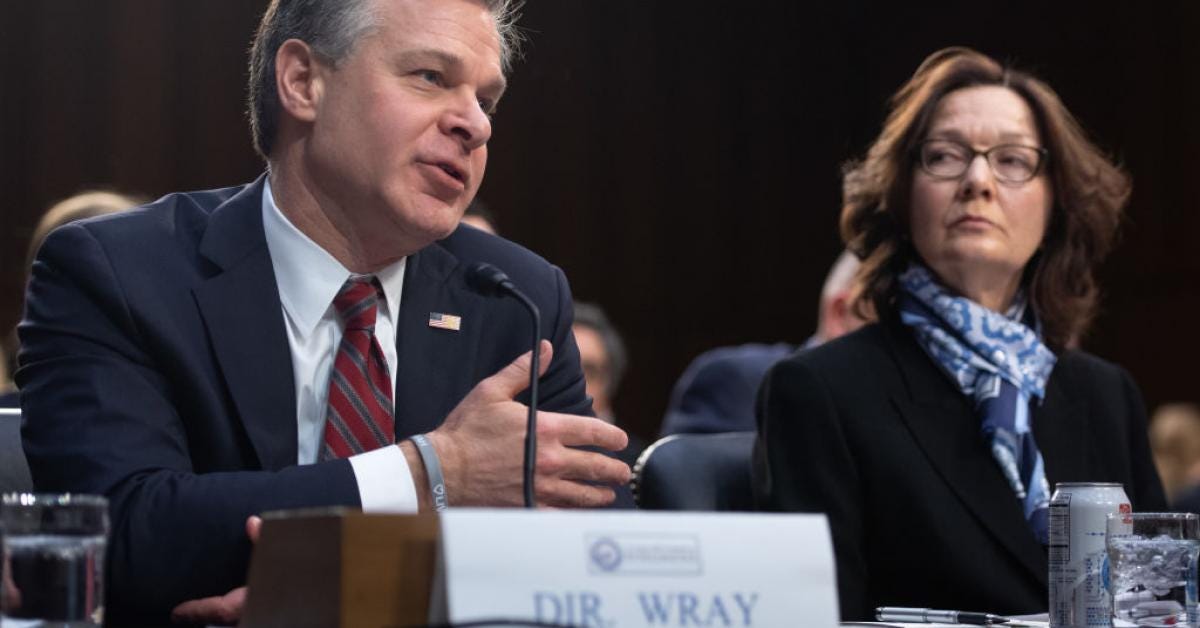President Donald Trump’s firing of elections security chief Christopher Krebs is a test: Absent any protests from top Republicans over Krebs’s dismissal, look for the president to move next on top spy Gina Haspel and FBI Director Christopher Wray.
Without significant headwinds, the president will almost certainly feel emboldened to move on the last two remaining intelligence and security leaders who have drawn his ire. None could be found speaking up by early evening.
Trump previously replaced the director of national intelligence with a succession of ideological allies and last week moved other far-right partisans into the top ranks of the Pentagon.
Trump fired Krebs by tweet Tuesday, only hours after the Department of Homeland Security cyber official had publicly debunked Trump’s claims that the 2020 presidential election was “rigged.”
Krebs, director of the DHS’s Cybersecurity and Infrastructure Security Agency, had said in his own tweet that “59 election security experts all agree, in every case of which we are aware, these claims either have been unsubstantiated or are technically incoherent.”
After he learned he’d been fired, Krebs tweeted, “Honored to serve. We did it right. Defend Today, Secure Tomorrow.”
The president and his Republican allies had not won a single substantive court challenge to the vote.
Yet Trump continues to insist without any evidence that “there were massive improprieties and fraud" in the vote, citing his own and other baseless conspiracy theories.
Trump has also exhibited increasing public and private hostility to CIA Director Haspel, starting with her refusal to contradict the intelligence community’s long ago findings that Russia interfered in the 2016 election and has continued its covert campaigns to sow chaos in American politics. She was excluded from last Friday’s daily intelligence briefing of the president, according to multiple news reports.
“A senior administration official told CNN that her exclusion was not a good sign for the CIA chief even if her presence is not normally mandatory,” according to a roundup by The Hill newspaper.
But Haspel, a 35-year veteran of the spy agency, has powerful Republican allies on the Hill, none more so than fellow Kentuckian and Senate Majority Leader Mitch McConnell. As Trump’s threats to fire her gained steam last week, McConnell made a very public gesture of inviting her to his office while she was on the Hill to a regularly scheduled briefing of the Senate Intelligence Committee.
The panel’s Republican chairman, Sen. Marco Rubio of Florida, also offered a public statement of support for Haspel.
“Obviously any director serves at the pleasure of the president, and I’m not the president,” Rubio told Politico after the 90-minute closed-door briefing on Tuesday. “But if you ask me my opinion, I think she’s done a good job.”
It’s not clear whether Wray has similar support, but in late October the powerful FBI Agents Association sent a letter to both Trump and then-Democratic candidate, now president-elect, Joseph Biden urging he be kept at the helm.
“FBI Special Agents respect Director Wray’s leadership and look forward to continuing to work with him to protect this great country from national security and criminal threats,” wrote Brian O’Hare, whose organization represents thousands of current and former FBI agents.
As with Haspel, Trump has privately and publicly assailed Wray for contradicting the president’s narrative that Moscow played no role in helping him win the presidency by covert means, including stealing and helping disseminate the private emails of Democratic Party officials and Hillary Clinton’s campaign chairman, and for not purging FBI agents who he claims conspired against him. Trump is also said to be mad that Wray didn’t launch a formal investigation into Hunter Biden's foreign business connections.
Trump admitted to NBC’s Lester Holt in 2017 that he fired Wray’s predecessor James Comey because the FBI director wouldn’t call off an investigation into Russian interference in the elections.
O’Hare warned that firing Wray, who has six years left in his 10-year term, “could lead to instability and damage to the bureau’s operations, which is why Congress intended to insulate the position of director from political whims.”




